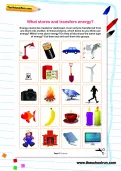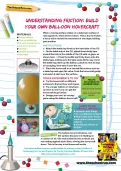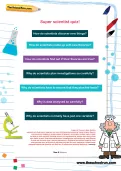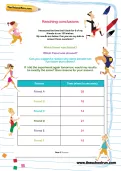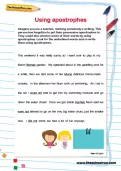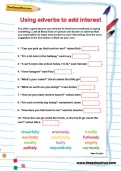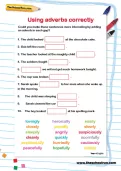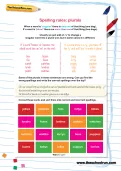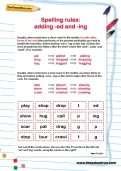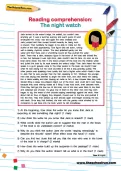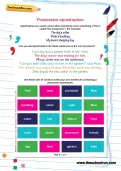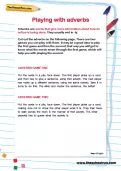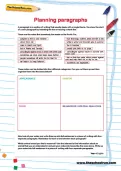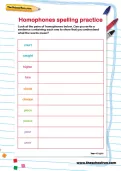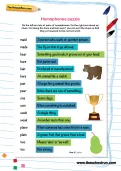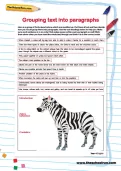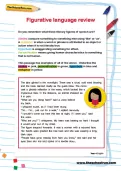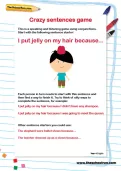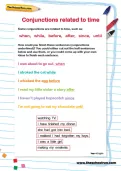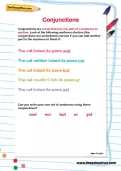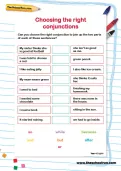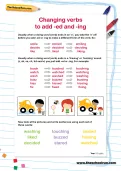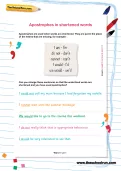A passage of text containing hyperbole and personification. Children need to read the definition of each and then highlight each in different colours.
or
Register to add to your saved resources
Already a subscriber? to view this content.
A passage of text containing words that need shortening with the use of apostrophes. Children are encouraged to 'mark' the text and write alternatives above each part that is underlined.
or
Register to add to your saved resources
Already a subscriber? to view this content.
A list of sentences containing speech. Children are encouraged to use the bank of adverbs to improve the sentences.
or
Register to add to your saved resources
Already a subscriber? to view this content.
A list of sentences which could be improved by the use of adverbs. A bank of adverbs is included at the bottom of the sheet to help your child.
or
Register to add to your saved resources
Already a subscriber? to view this content.
A worksheet explaining the spelling rules for turning words with different endings into their plural form. Includes cards to sort into 'correct' and 'incorrect' piles.
or
Register to add to your saved resources
Already a subscriber? to view this content.
A worksheet explaining the spelling rule for adding 'ed' and 'ing' to verbs that have either a long or short vowel. Includes cards for your child to cut out and re-arrange to help with their spelling.
or
Register to add to your saved resources
Already a subscriber? to view this content.
A passage of text along with questions designed to prompt your child to retrieve information and infer ideas about characters' feelings. Answers are included.
or
Register to add to your saved resources
Already a subscriber? to view this content.
Explanation of how to use possessive apostrophes and then some activities to help your child put this concept into practice.
or
Register to add to your saved resources
Already a subscriber? to view this content.
Cut up these adverbs and then play the two games suggested. This will help your child to understand the meanings of different adverbs and encourage them to use them when speaking and writing.
or
Register to add to your saved resources
Already a subscriber? to view this content.
Notes on the Arctic Fox for your child to cut up and then organise into different subject boxes. They then need to use these notes to write up their own paragraphs, understanding the need for keeping to a single theme for each.
or
Register to add to your saved resources
Already a subscriber? to view this content.
Pairs of homophones and then blank boxes for your child to write their own sentences containing each homophone, demonstrating that they understand the meaning of each.
or
Register to add to your saved resources
Already a subscriber? to view this content.
Encourage your child to cut up the pairs of homophones and the mixed-up definitions and then work out which should go with which.
or
Register to add to your saved resources
Already a subscriber? to view this content.
Various sentences about zebras for children to cut out and then sort into paragraphs. This activity should help your child to understand how each paragraph in a text needs to be about a single theme.
or
Register to add to your saved resources
This challenging worksheet includes a description of hyperbole, metaphor, simile and personification. It then includes a piece of text containing all four types of figurative language for children to consider and highlight.
or
Register to add to your saved resources
Already a subscriber? to view this content.
A fun game to encourage your child to use the word 'because' in longer sentences when they are speaking and writing.
or
Register to add to your saved resources
Already a subscriber? to view this content.
A list of half-sentences with a time conjunction at the end. Children need to complete the sentence, thinking about what the conjunction means.
or
Register to add to your saved resources
Already a subscriber? to view this content.
A similar sentence repeated several times but with a different conjunction each time. Children need to think of ways to end the sentence.
or
Register to add to your saved resources
Already a subscriber? to view this content.
A list of sentences with the conjunction in the middle missing. Children have to choose from the list at the bottom, making sure that the sentence makes sense.
or
Register to add to your saved resources
Already a subscriber? to view this content.
This worksheet explains the rules for changing the tense of verbs ending in 'e' and also those that end in 'hissing' and 'buzzing' sounds.
or
Register to add to your saved resources
Already a subscriber? to view this content.
This worksheet explains the use of apostrophes to shorten words and then gives example sentences containing words for children to alter.
or
Register to add to your saved resources
